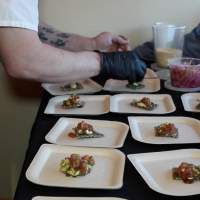Change is in the air as a crowd gathered for the panel on CODE: Debugging the Gender Gap. People from across fields listened to the current gender discrimination in the STEM community, and what these six individual activists were doing to influence it.
Addressing the hard issues has been a running trend of BIFF this year, and today kicked off with a discussion on the tech industry’s gender gap. A panel discussing the movie was followed by a ‘Cookies and Conversation’ session, both of which provided an honest perspective into the lives of women in the tech field.
Multiple women after the panel commented on how they had felt discrimination throughout their careers; one woman even commented on how the phrase “Don’t bring that little girl in here again,” had been used about her. While the panel addressed the gender discrimination in the field, it focused on what the incredible panelists were doing to change it.
One of whom, is already carving out her path to make a difference. Elicia Dennis is a force to be reckoned with – studying electrical engineering at Notre Dame and is taking a year off to educate under privileged students in the Denver metro area about the science, technology, engineering and mathematics (STEM) field.
The phrase “I can’t” has been banned from her classrooms and she’s working towards building a future in which she has played a role in closing the gender gap. After the panel, she shared how her experience with foster care is one of the driving forces encouraging her to use her electrical engineering degree to motivate inner city children to follow STEM careers.
A witty mediator, Sue Heilbronner, brought everyone’s efforts to light as the panelists discussed their impacts in the filmmaking, business, and research fields. Not to mention a guest video chat with Congressman Jared Polis who advocated for encouraging more gender equal programs in Colorado.
A booming tech industry is what brings this issue to the forefront. The passion for equality rose as the event came to a close. As one of the panelists Danielle mentioned, “Everything you touch uses code.” Code is so prevalent in everything we do, and yet half of the population is not being brought into this ever growing field.
By the end of the talk the panel had opened up a space for a room of strangers to relate on common ground and share their experiences in the field. As one of the panelists mentioned in her closing comments, the biggest thing we can do to move forward is to tell women, “No – you do belong here.”




